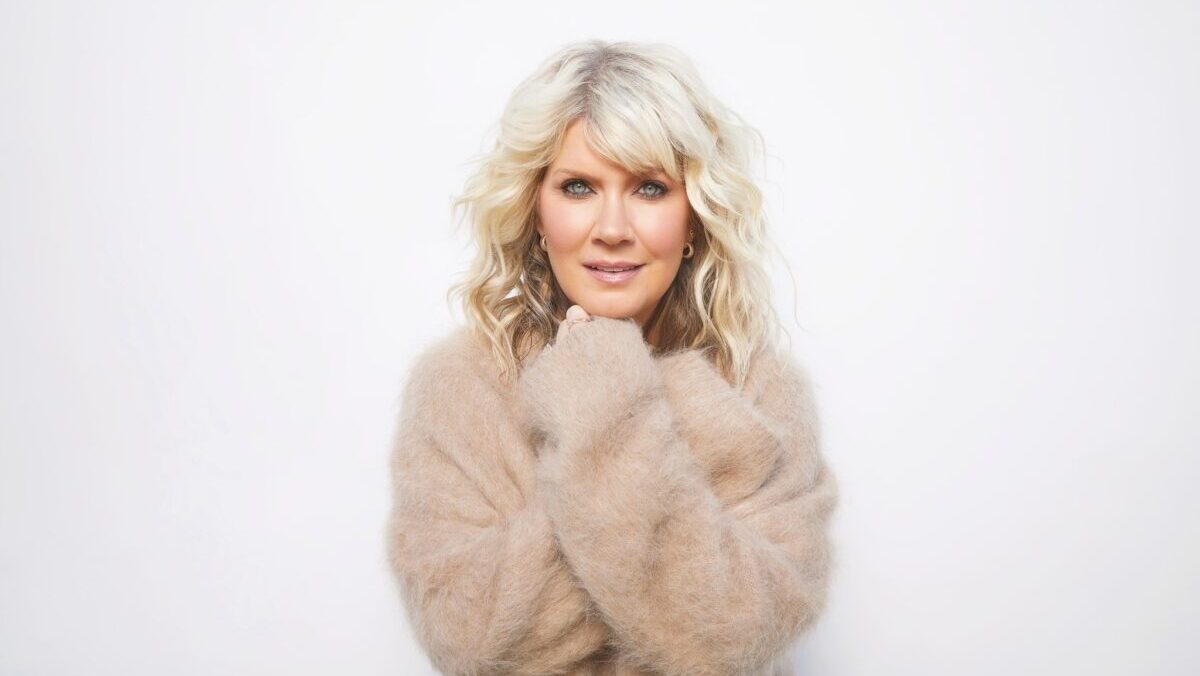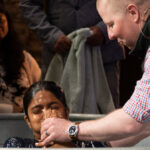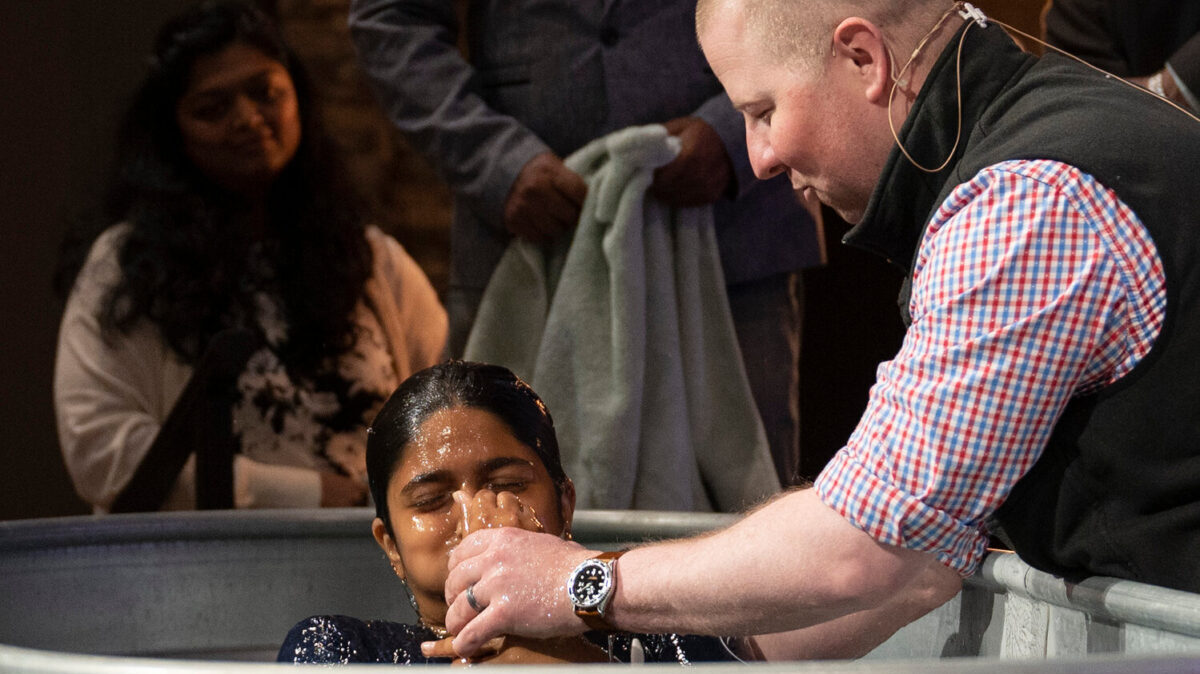With her new album “Seasons,” award-winning Christian recording artist Natalie Grant wants to connect audiences to Christ’s unwavering faithfulness and His power to sustain His children as they walk through various stages of life.
Desiring for the songs to be relatable to listeners, Grant took a reflective look at her personal journey with the Lord when selecting songs for this album.
“Sometimes we think that God is going to get us out of the storm instead of realizing that He may have actually been preparing us for the purpose of going through the storm,” Grant shared with The Baptist Paper. “We learn more about the character of the God we serve when we’re in the middle of the storm than we do when we are on the mountaintop. I had been saying, ‘Lord, get me out of these storms. Stop the storms.’ However, Jesus was saying, ‘No, I’m coming into your storm.'”
Following the birth of her third child in 2010, Grant suffered postpartum depression while resuming a busy touring schedule. During this time, her father was diagnosed with cancer and her nephew struggled with a heroin addiction.
“Postpartum depression was something I struggled with very privately and quietly,” Grant acknowledged. “I felt this shame and thought that I couldn’t talk about it because what kind of mother would I be, that I would be questioning the sovereignty of God? My daughter, Sadie, was the miracle that I didn’t know to ask for and a precious blessing to our family that we didn’t expect.”
Storms gathering
Grant felt the storms intensifying all around her, but she was afraid to admit that the waves were about to come crashing down.
“My family was facing serious situations with my father and nephew that we had never experienced before, and I felt like the storms of life were pounding down all at once,” Grant said. “You get to this place where it’s like, ‘Enough, I just can’t take anymore!’ I found myself in this pit of darkness that I had never been in before. I had never experienced depression, and it was becoming harder each day to put one foot in front of the other. It didn’t make any sense to me, but I still couldn’t shake it. It was quite crippling for me, and I struggled for about 18 months.
“When I got to the place of admitting my brokenness, I think that’s when the Lord was able to take hold. Dealing with depression as a Christian artist was so shameful to me because I thought, ‘What kind of Christian am I? I’m singing all these songs and quoting all these Bible verses that I’m telling everyone else to follow, but I’m not believing it in my own life.’ I think that’s why I struggled longer than I should have, because I just stayed quiet about it. Once I started to give a voice to it, I saw God using my weakness to show His strength and power. I ended up writing more songs on this record than I’ve ever written before. It’s amazing how the songwriting process became a catalyst for my healing.”
While sharing stories about trials and triumph, Grant emphasizes to audiences the importance of surrendering weaknesses over to the Lord and relying on His power, protection and provision.
“My prayer is that these songs will be like an anchor to people,” Grant said. “When I hear stories about how these songs have impacted families and find out that God really did answer the specific prayers for them, it’s very humbling. If you listen to the record, it’s not a reflection of where I was living. It’s a reflection of where I believed I was going, and that is the result of having hope. Hope is what keeps the light on in the dark moments. Hope is the thing that helps us put one foot in front of the other, knowing that we may be in the midst of pain but believing that a better day is coming. I really wanted songs that were hopeful and full of encouragement because that’s what I was looking for in my own life.”
As a mom of three teenage daughters, Grant strives to balance ministry and motherhood while teaching her girls valuable lessons about their self-worth and identity that is secure and found in Christ alone. Grant has written multiple books, including the “Glimmer Girls Series” for preteen girls.
Justice
Grant also has a heart for missions and is the co-founder of Hope for Justice, a nonprofit organization with offices in seven countries across five continents working to fight against modern-day slavery.
“I think God is really showing me what it means to live a life that’s daring and in relentless pursuit of Him and the things He’s called me to. (He has me) thinking about, ‘What did Jesus do? How did He live? And how can I model the time I have on earth after His example?”
Several years ago, after watching an episode of “Law and Order,” Grant’s life was changed by a story “ripped from the headlines” — a fictionalized version of the harsh reality of human trafficking, where children often are exploited as cheap labor and many as sex slaves.
“I couldn’t believe what I was seeing — 10-, 11-, 12-year-old girls in cages, shipped over to America to be used as sex slaves by being forced into prostitution,” she recalled. “As I sat there in my comfortable home, sipping my tea, I thought to myself, ‘There is no way that is true. I mean, maybe somewhere else in the world, but not here in America.’ I had never even heard the term ‘human trafficking.'”
Grant began researching the subject and was horrified to learn that each year, more than 600,000 people are sold and abused worldwide, with at least 14,000 shipped to America.
While researching this issue, Grant found an organization devoted to rescuing children from prostitution and giving them a home, an education and the skills to make a living on their own.
“I was walking down the street in Mumbai in broad daylight when my eyes locked on a little girl, maybe 6 or 7 years old, peering out of a cage, looking at us on the street below. I’ll never forget that moment. That was her life. Every day people walked by, and they didn’t even notice her.”
Desiring to make a difference, Grant subsequently took action. She called the organization’s office and expressed her desire to help. Within a matter of months, she and her husband, Bernie Herms, traveled to India to visit the red-light districts, witness human trafficking up close and see what was being done to stop it.
“As a little girl, I was given many comforts,” Grant said. “I lived in a suburb with two parents. I had everything I could want and more. And here, I look at these girls who have nothing familiar, no mother or father, no playground, sports, school — all the things we take for granted that are a part of our normal childhood. No matter who we are, we need a place where we belong and we feel safe. These girls have none of that. It has been ripped away from them.
“I want to do whatever we can to help them be able to become kids again and to give them their childhood back. Every day, I’m amazed how God is opening doors for me to share about this. What I thought was going to be my life all along — playing music — is now my platform to encourage the Church to get involved beyond their four walls, to do something that Jesus has taught us: to love your neighbor as yourself.”










